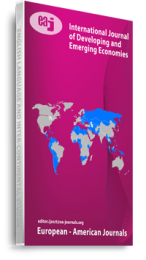Nigeria continues to face high fiscal deficits, low institutional quality, and sluggish economic growth despite numerous efforts to enhance economic performance. While extensive research has focused on the impact of fiscal deficits on economic performance, limited attention has been given to the combined effects of fiscal deficits and institutional quality in the Nigerian context. This study investigates how fiscal deficits, institutional quality, and their interaction influence Nigeria’s economic performance from 1987 to 2022. Using GDP growth rate as a measure of economic performance, the analysis incorporates fiscal deficit, institutional quality as the independent variables and includes interest rate, inflation rate, and gross fixed capital formation as control variables. Preliminary unit root tests confirmed that the variables were integrated at orders zero and one, making them suitable for the Autoregressive Distributed Lag (ARDL) estimation approach. The results at a 5% significance level revealed that, in the long run, fiscal deficits negatively but insignificantly impacted economic performance. Similarly, in the long run, institutional quality also negatively but significantly influenced economic performance. The interactive effect of fiscal deficits and institutional quality on economic performance was negative and insignificant in both the short and long run. Diagnostic residual tests confirmed the model’s reliability. The study concluded that fiscal deficits and institutional quality, both independently and interactively, do not significantly drive economic performance in Nigeria. The study recommended targeted reforms to address fiscal deficits and institutional quality separately, alongside other macroeconomic strategies, to advance Nigeria’s economic performance.
Keywords: Economic Performance, Nigeria, fiscal deficit, institutional quality

